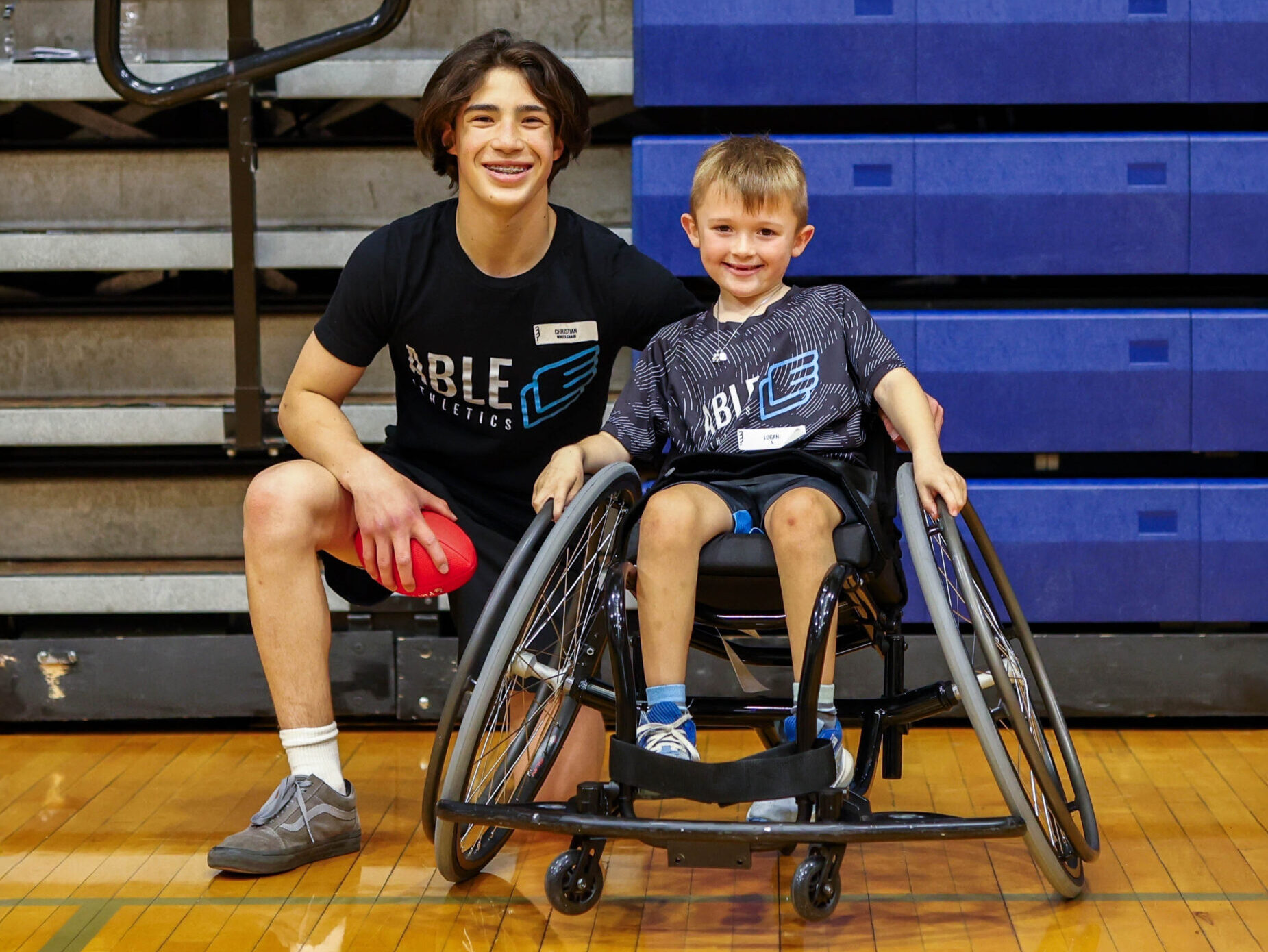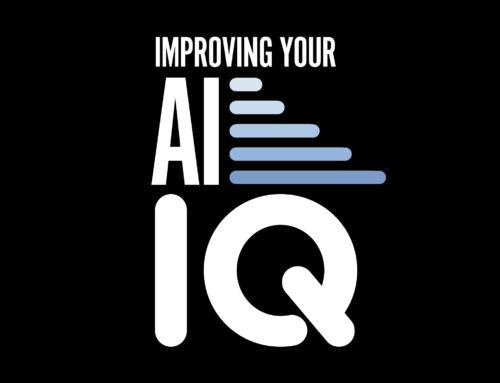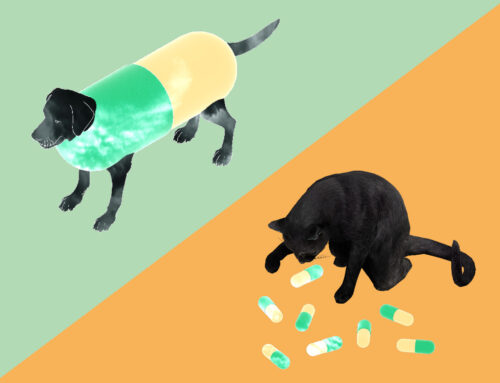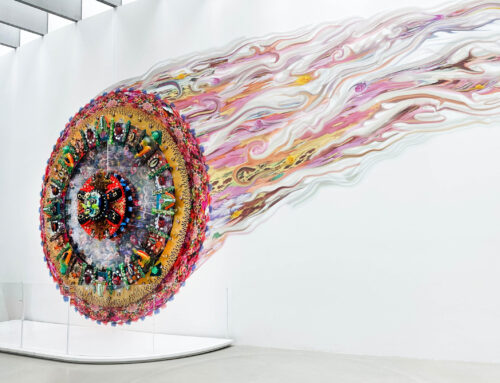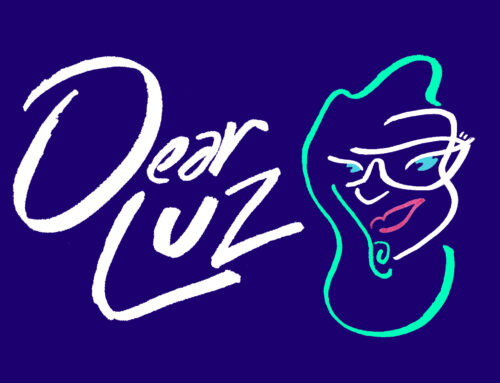By Elijah Willner
In 2020, brothers Rowan and Christian Dias approached their mother with an idea. They loved that their younger sister, Elle, who was diagnosed with a rare genetic neurodevelopmental disorder called MED13L Syndrome, always enjoyed playing lacrosse with them. However, her disabilities meant she was unable to participate in the same children’s lacrosse classes as her neurotypical peers. The boys taught her themselves, but they knew nothing could replace the feeling of playing with a team. “It was really their love for her that helped my husband and I through the initial stages of grieving the loss of the life that we expected for our daughter,” says Vanessa Dias, the boys’ mother and CEO/co-founder of Able Athletics. “They just saw her as their little sister, which was so beautiful.”
“One day,” Dias continues, “in the middle of COVID lockdown, the boys, who were 13 and 10 at the time, decided they wanted to teach other kids like their sister how to play lacrosse. They had learned how to modify and adapt the sport from the physical therapist who came to our home, and they were excited by their success.”
The brothers wanted to start a team that could help other children and their families in similar situations, and Able Lacrosse, now rebranded as Able Athletics, was born. News of the new organization initially spread through word-of-mouth, with Dias reaching out to her network of therapists and professionals in the special education community. Because of the lockdown, many parents were seeking social situations for their differently abled children (and themselves), and Able fit that need; plus, it was a great excuse to get outside.
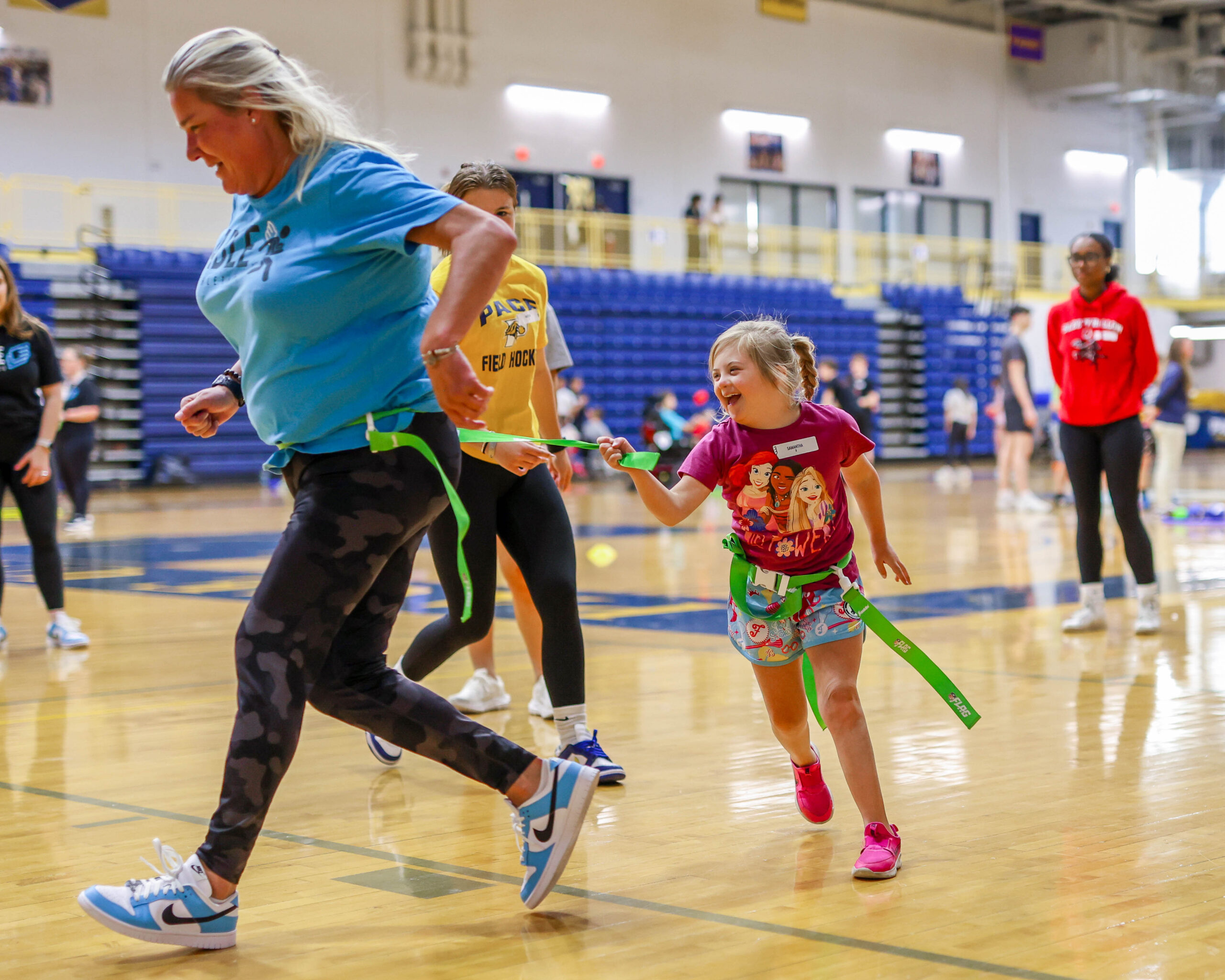
Woman and child playing a sport.
Assembling the team
“Starting during COVID was definitely hard,” says Dias. “We never thought it would get to the point where we have as many volunteers as we do now, and they’re all here because they want to educate and engage with our community.” Parents appreciated that the organization is run by and for parents of children with special needs—a welcome change from groups unfamiliar with accommodating disabilities. Able serves children with autism, visual or hearing impairments, developmental disabilities, learning disabilities, and physical disabilities.
“A big part of why Able is so successful is our collaborative approach,” says Dias. “The coach plans the practice, and then we collaborate with our occupational therapist, our physical therapist and our speech therapist for modifications and adaptations. We’re really thinking about how to help this group of athletes with these types of needs. We’re changing stations and/or drills every time. There’s a lot of preplanning that goes into those 45 minutes of a practice to make it successful, and it works. That ‘Able magic’ wouldn’t happen without it.”
“It was the first activity my son, who has autism, could do where he could actually participate, and I wasn’t the parent on the field with him, which is something many people take for granted,” says Melissa Ponzio, board member, chief programming officer/director of field hockey for Able Athletics, and a physical education teacher at Fox Lane’s middle and high schools. “I remember going to the first Able Lacrosse session, and Erica and Vanessa said, ‘Just sit down and watch.’ I thought, ‘What do you mean, just sit down and watch? I have to run around.’”
Ponzio’s son had a tendency to run or bolt, which was stressful for her. “He doesn’t do that so much anymore, but at the time, I felt like I couldn’t do anything, and I always had to be attached to him,” she explains. “With Able, I got an hour to sit down and relax because varsity athletes were working with my son and having a blast.” It was the first time Ponzio’s son could join a sports team. “It might look different, and he might have different goals, but this is a chance for him to participate,” she says. “It’s a chance for my son and my family to have a community.”
Being a field hockey coach herself, Ponzio helped Able expand to include the sport, and the organization transformed into the multi-sport program it is today. Able Athletics now offers sports based on capacity and available volunteers, with flag football, field hockey, lacrosse, wheelchair lacrosse and wheelchair football on tap for the 2025-26 season.
Over the past five years, Dias and Ponzio have built a large team of adult volunteers. “Able is really run by a bunch of moms who hustle,” Ponzio says with a laugh. Those moms are joined by a large group of therapists and coaches, including Elle’s physical therapist, Erica Maiorano, and Christian’s lacrosse coach, James Sinoitz, who have been board members since the organization’s inception.
“We’re not happy with just being good enough; we want this to be meaningful,” says Ponzio. “We want it to be a great experience for our athletes and their families, too. This organization does not run without its volunteers, and we are so immensely grateful. Whether it’s a high school athlete or a therapist or a coach, they’re giving up time on their Sundays just to make the sport, whatever the sport is, the highlight of our athletes’ week.”
“The majority of our internal Able staff have a child in the program,” Ponzio continues. “That, obviously, means they’re extra driven to make it special for our kids, because this is their team, too.” Ponzio and Dias say the parents have tremendously benefited from Able as well. “I became a new special needs mom during the pandemic, and I was yearning for a community. It was a really lonely time to get a diagnosis—you really couldn’t connect with anyone,” Ponzio explains. “I’m so glad I joined Able because these are my son’s peers, and they’ve also become families that I’ve connected with; they’ve become my friends.”
Many community leaders and figures in sports education have joined the Able community, serving as coaches and directors. People such as Britt Paulus (basketball assistant director), Marta Parker (flag football director), Pat Aris (wheelchair football coach), Lisa Canniff (wheelchair sports director) and Jeremy Guski (a teacher and lacrosse coach who is also an Able Athletics board member, lacrosse co-director and wheelchair lacrosse head coach) all fill important roles at Able, taking on responsibilities essential to the organization’s success.
Able’s community has also expanded to include businesses and organizations that donate funds or services to assist with some of the costs associated with a nonprofit for children with special needs. These funds help cover expenses such as insurance, athletic wheelchairs (Able currently has 16), and a trailer to store them. An essential partner is Cindy Dwyer of the Andrew K. Dwyer Foundation, which provides scholarships for families in need. Additionally, Able has received several grants from Westchester County and numerous in-kind donations, including one from Rippowam Cisqua School, which is where Able has held sessions and scrimmages for the past year and a half.
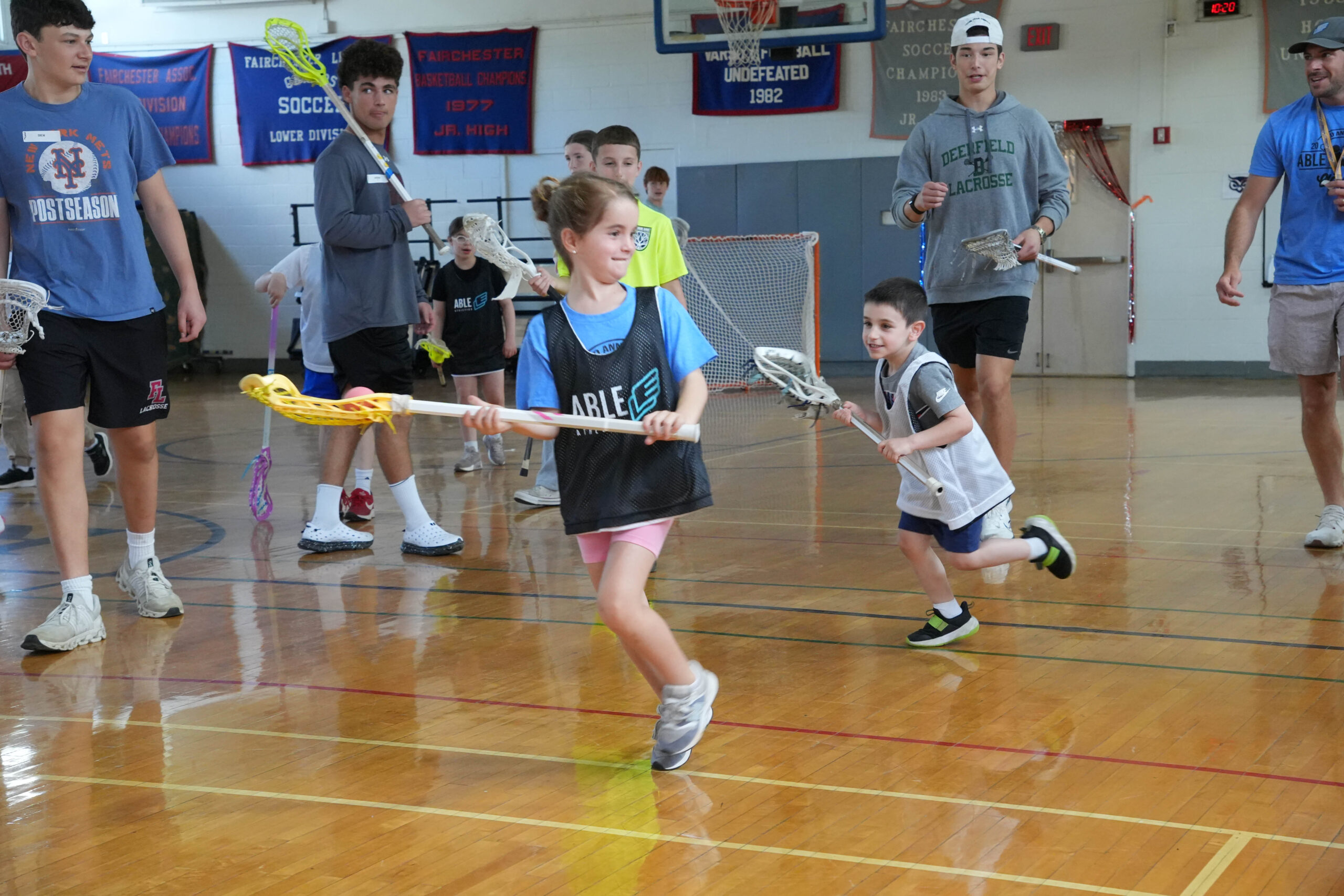
Kids playing lacrosse.
From backyard to big league
Many varsity athletes from Armonk, Bedford, Bronxville, Brunswick, Fairfield, Fox Lane, Greeley, Greenwich, Hackley, Harrison, Hartsdale, Mahopac, Ossining, Pleasantville, Ridgefield, Rye, Rye Brook, Scarsdale, Somers, Tarrytown, White Plains, and Yorktown also volunteer their time, teaching these young athletes how to play their sport and assisting during games. Along the way, they gain a deeper understanding of how to communicate and work with people with disabilities. “We do some onboarding education for new volunteers,” Dias explains. “We meet with them prior to the session and give them a rundown of what to expect, what they might see, and what sort of things they should do while they’re supporting a kid. We always have therapists on-site who can model what to do in a circumstance where they have to engage or support an athlete who perhaps needs a break or is struggling to communicate their needs.”
Dias says a lot of the teen volunteers are males. “I grew up volunteering a lot, and it was always the high school girls volunteering,” she says. “Offering lacrosse helped us tap into a pool of volunteers who wouldn’t typically volunteer for this type of opportunity. But they get to share their love of their sport with these kids, and that’s special. And Melissa brings in the amazing female athletes through field hockey.” Those relationships hold strong off the field as well. Dias says when she’s out with Elle and they run into a volunteer, the teen knows exactly how to engage with Elle. They are patient and persistent, allowing Elle time to warm up to them in a different environment before they can connect.
“I’ve seen the ripple effect of my students at school who volunteer and how it positively affects them,” says Ponzio. “It’s amazing to see volunteers go to college and work in special ed. because of their experience with Able.
More than just a game
Able Athletics now boasts 485 athletes, 945 volunteers, 22 therapists and 48 coaches. They have received supportive grants, equipment or training with athletes from professional organizations like the New York Giants, USA Lacrosse and USA Field Hockey. Thanks to Ponzio’s “aggressive networking,” Giants players have attended Able’s last two spring clinics. “They worked on skills with our athletes, engaging with them, and taking time for photos and autographs,” says Ponzio. “Most recently, on July 23, we brought a group of Able Athletes and their families to the Giants training camp. It was such a special experience for everyone—our athletes had the chance to watch them practice, go on the field for a meet-and-greet with several Giants players and receive autographs. At the end of the day, the Giants surprised Able Athletics with a $5,000 donation. We are so grateful for their partnership and continued support.”
And like many youth sports teams, there are even opportunities to travel. Last October, lacrosse athletes travelled to Indianapolis for the USA Lacrosse Experience. “We took the athletes and their families to participate in the expo,” says Dias. “There, we met athletes from the USA men’s team, the Puerto Rican men’s team, and the UK women’s team. The next day, members of the UK men’s and women’s teams came out to support a clinic for the kids. It meant the world to my boys that they got to travel for Elle’s tournament and attend Elle’s team dinner. They were so excited about being able to support their sibling in this incredible opportunity.” Next summer, they hope to attend the Field Hockey World Cup. “We have some pretty lofty goals between USA Lacrosse, USA Field Hockey and the Giants,” Ponzio admits with a laugh.
Starting as a backyard-to-backyard lacrosse clinic for children with special needs, Able Athletics has grown into a proud symbol of inclusion for those who may have ruled out a life of sports for themselves or their children. “We have a lot of fun, and we try to give these children amazing experiences that are parallel to other youth sports,” Dias explains. “These kids are working really hard in their private therapies—whether it’s PT, OT, speech or vision—and sports help them get out into the real world and practice their skills in a functional setting.”
“We even have swag,” Dias continues. “Our kids often wear their Able gear to school with pride, just like any other kid would wear their team jersey. Now, whenever Elle sees the logo we put on our shirts and hats, or when she sees anything blue out in the world, she gets beyond excited. It’s become a symbol of her opportunity to be a part of something. It’s a symbol of her community.”
This article was published in the July/August 2025 edition of Connect to Northern Westchester.


